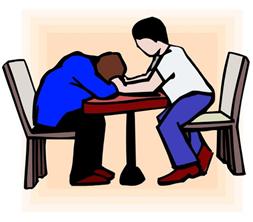A Bridge Too Far
 A simple point of logic: A bridge between a lie and the truth is built with facts.
A simple point of logic: A bridge between a lie and the truth is built with facts.
Facts are realities that are made of nondestructive material, yet we often won’t walk in their direction when someone is attempting to build a bridge between our illusion and the firm footing of reality.
We won’t cross that bridge because we fear what’s on the other side. It’s a bridge too far.
The worst person to get into an argument with is a true believer. These are people who ignore facts. When you present them with irrefutable proof, they ignore what you just showed them and move the goal post. In other words, each time you meet their burden of proof, they expand the criteria they need to be convinced. If you play their game, you are building a bridge to nowhere.
There is nothing scarier than walking away from your illusion. It’s a bubble bursting moment. Many of us won’t even take the first step and walk towards the edge. We deem our illusions as safe havens.
Reminds me of a story . . .
I remember being about 5 years old and playing hide-and-go-seek with a group of friends. My belief was that if I closed my eyes, they wouldn’t be able to see me. When they announced that they had found me, I refused to believe them and argued that if my eyes were closed, I couldn’t be seen.
Because I refuse to see doesn’t mean that others are blind.
Think of our safe haven in these terms: With the explosion of the internet, blogs and 24 hour cable news, there is lots of information available to us. If we pay attention only to our handful of computer bookmarks and only watch the Food Channel, we will starve ourselves of reality.
The reality we are truly afraid of is that the truth we’ve been defending is a lie.
Our cocoon keeps us sheltered from reality and the only way out is to bridge the gap towards the edge where more vistas can be seen.
Open your truth up to inspection and quit defending it. Truth doesn’t need a defense.
Once you quit using your energy to stay in the dark, you let in enough light to see the bridge to reality.
It’s not necessary to leap towards reality; that may be too jarring. One step at a time is all that’s necessary to move away from a confining illusion.
I’m not claiming that what’s been presented here is the full version of this reality strategy; just consider it the abridged edition.
All the best,
John
ACCOMPLISH ANYTHING
LOSE WEIGHT & KEEP IT OFF
STOP SMOKING FOREVER
SLEEP THROUGH THE NIGHT EVERY NIGHT
IMPROVE YOUR SELF CONFIDENCE
I LOVE MY BODY
RELAX IN 2 MINUTES
FEEL FOREVER YOUNG
VIRTUAL MASSAGE
Be Sociable, Share!

 We’ve heard enthusiastic people say that “Anything is possible,” and perhaps we scoffed. That’s because we deemed the probability of that possibility to be south of remote.
We’ve heard enthusiastic people say that “Anything is possible,” and perhaps we scoffed. That’s because we deemed the probability of that possibility to be south of remote. When you have the option of choosing, which of these do you choose: Good, Better or Best?
When you have the option of choosing, which of these do you choose: Good, Better or Best? Funerals are sad and tombstones can be sadder.
Funerals are sad and tombstones can be sadder.
 One of the most powerful word combinations we can use is: “I’m sorry.”
One of the most powerful word combinations we can use is: “I’m sorry.” How psychic are you?
How psychic are you?
 There is a difference between being nosey and being curious. One leads to the land of “None of Your Business” and the other lights a path to new learning.
There is a difference between being nosey and being curious. One leads to the land of “None of Your Business” and the other lights a path to new learning. I believe the art of persuasion is not getting someone to do something they don’t want, but, rather, getting them to do something they do want to do.
I believe the art of persuasion is not getting someone to do something they don’t want, but, rather, getting them to do something they do want to do.